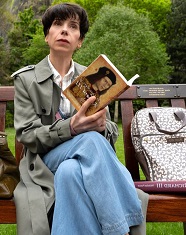The Lost King
 Philippa Langley is a British citizen who spearheaded the 2012 search to locate the burial site of King Richard III, exhume his remains, and ultimately change the long-held narrative of his short life. Langley is not an archeologist nor an investigator of any kind. She is simply a woman who had a passion to change public perception.
Philippa Langley is a British citizen who spearheaded the 2012 search to locate the burial site of King Richard III, exhume his remains, and ultimately change the long-held narrative of his short life. Langley is not an archeologist nor an investigator of any kind. She is simply a woman who had a passion to change public perception.
Her 2013 book “The King’s Grave: The Search for Richard III” is considered a real page-turner. Unfortunately, Stephen Frears’ cinematic adaptation, “The Lost King,” suffers from the elimination of whatever spark inspired Langley’s obsession. We see Langley passed over for a promotion at work, engaged in a perhaps too-routine family life with her husband and boys, and generally plodding through life’s trajectory.
Changing history
One night, she and her elder son enjoy an evening at the theatre when they see a stage adaptation of Shakespeare’s “Richard III.” For whatever reason (to which we are not privy, at least in Steve Coogan and Matt Pope’s adapted screenplay), Langley believes Shakespeare’s version of the king is unfair – that he was not a usurper, a killer, or even a hunchback. On a whim, she attends a bookstore basement meeting of the Richard III Society – a small group who share her concerns about Richard’s place in history.
One of the attendees explains to Philippa that when a lie is repeated long enough, it becomes the truth. Therefore, Shakespeare’s personification of the king has become the truth, whether it is accurate or not. Philippa sets out to change the historical account.
The long road to retribution
At a lecture, she meets an historian who has traced Richard’s genealogy to a living Canadian citizen. His direction leads her to a University of Leicester archeologist, who has no interest in pursuing Richard III until the university eliminates most of the funding for his department. Now determined to prove his work, the professor applies his skills to Langley’s pursuit.
And so it goes, doors close and then open as Langley determinately seeks retribution for the king. But again, what’s stubbornly absent in “The Lost King” is any sense of motivation. Why is this simple workaday woman willing to go to any lengths (including letting her work and family life suffer) to set the record straight regarding a king whose short reign occurred over 500 years prior? I’d like to set the record straight on certain people and certain events, but I don’t make it my life’s work. Something inspired Philippa Langley, and watching “The Lost King” will not fill in that blank.
 Sally Hawkins
Sally Hawkins
Having said that, Frears’ film is somewhat saved by his choice of lead actress. I’ve written many times that Sally Hawkins can take a so-so screenplay and make a film great simply by her performance. The sense of joy and honesty she brings to her characters makes them instantly watchable. We want them to succeed because we like her. In “The Lost King,” we want Philippa Langley to battle the naysayers all the way to the top in her effort to rewrite history – even if she’s up against no less than William Shakespeare, often considered the greatest playwright of all time. We may not understand her passion; but we can’t help but root for her.
I recall writing that Hawkins’ mute custodian who falls for a strange amphibious creature in Guillermo del Toro’s 2017 Oscar-winner “The Shape of Water” was worthy of that year’s Best Actress honor. But I tempered my enthusiasm by also noting that her performance in “The Shape of Water” was not even her best of that year. That role was her portrayal of folk artist Maud Lewis in “Maudie.” In other words, she’s so good she deserved the Oscar for her second best performance of the year!
Realistic marriage
Here, Hawkins makes “The Lost King” inspiring at the least, and downright involving at the best. I also like the fact that as her marriage suffers, she and her husband (played by screenwriter and actor Steve Coogan) separate, yet still remain close – particularly when it comes to their sons. In most Hollywood fare, divorced or separated couples despise one another from the get-go, never to be reconciled. Here, the Langleys operate in that “middle ground” area which is probably more common amongst those simply trying to work through their differences.
Fantasy angle
While this directorial choice gives “The Lost King” a sense of realism, another does not. Throughout her pursuit, Philippa sees Richard III on a regular basis. He appears to her during her “alone” times to discuss his legacy and encourage her quest. Played by Harry Lloyd, the actor who appears on stage as Richard in that early scene, the constant “checking in” with the king causes “The Lost King” to exist as somewhat of a fantasy, when the story itself is true and fact-based. This juxtaposition doesn’t quite work for me.
Mixed bag
So, “The Lost King” is a mixed bag. I could forgive the presence of Richard III had there been a sense of the inspiration that fueled Langley’s quest. Absent such motivation, I can recommend “The Lost King” merely for another outstanding performance from Sally Hawkins. Still, I’ll be glad to recommend a half-dozen superior films also featuring top-notch acting by Hawkins.
Andy Ray‘s reviews also appear on https://youarecurrent.com/category/nightandday/film-reviews/.